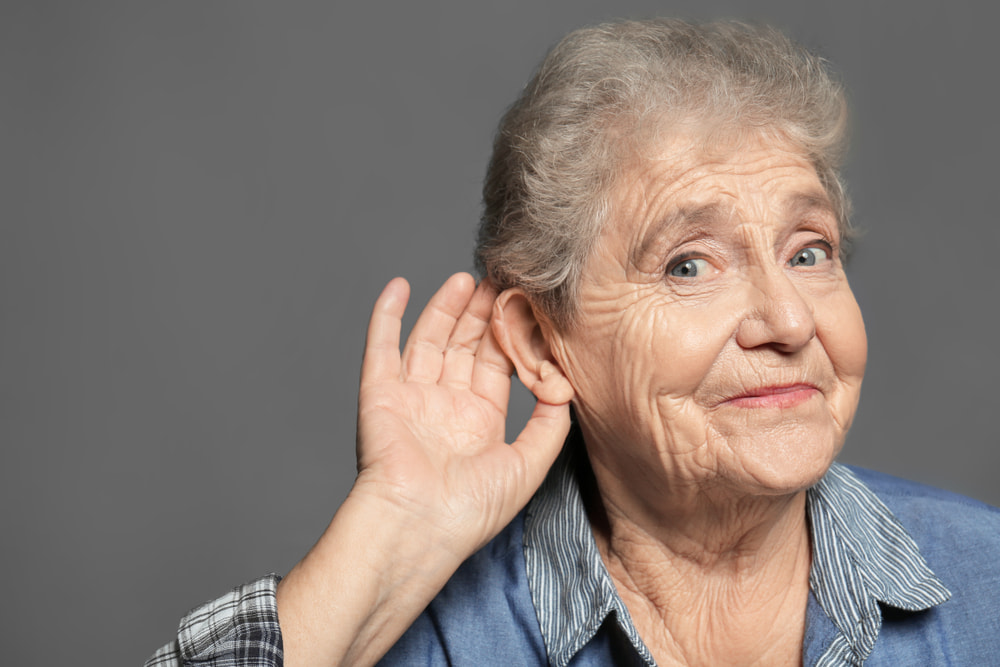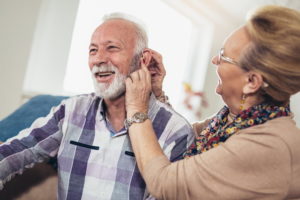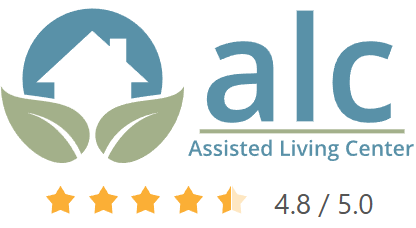
Do you have an elderly loved one who is having trouble hearing? It can be difficult trying to communicate with them if they don’t hear you well. You may be wondering what you can do to help. Don’t worry – you are not alone. Many families in West Los Angeles and beyond face this same issue each year. Fortunately, experts in senior care know how to help you make communication easier and improve the living conditions of your elderly loved one.
Let’s discuss how to deal with common challenges of hearing impairment in elderly and resistance to using hearing aids. Let’s get started!
How do you communicate with an elderly person who is hard of hearing?
There are a few things that you can do to help the elderly with hearing problems. When you start noticing that they have an issue with hearing, follow these tips:

- Speak one at a time – When you are talking to someone who has difficulty hearing, make sure that you speak one at a time. This will help them focus on what you are saying and they will be less likely to get confused.
- Face the person – When you are speaking to them, make sure that you face them directly. This will help them see your
- Speak clearly and loudly – Make sure that you speak clearly and loudly. This will help them hear you better, especially if they are in a noisy environment.
- Use visual cues and notes – Do this whenever possible. This can include pointing to what you are saying or using facial expressions.
- Don’t shout – Yelling will only make it harder for the elderly person to hear you, as you’ll change the frequency of your voice, and your facial expression can be misinterpreted as anger or frustration.
- Repeat yourself – If the person didn’t hear you the first time, make sure to repeat yourself. This will help them understand what you are saying.
- Rephrase your statement or question – This is a great way to get the elderly person’s attention and ensure that they are following the conversation.
- Let them choose how to communicate – Some elderly people may feel more comfortable communicating in a certain way. Let them choose how they want to communicate with you. This could include written notes, sign language, or lip reading.
- Be patient – allow them enough time and show that you care in more than just words, this way they will feel less isolated and misunderstood. This way, you’ll be able to support them in keeping their everyday routine and help them with other tasks.
How can I help the elderly with hearing problems?
Besides knowing how to communicate with your loved one after hearing issues occur, there are other ways that you can help them lead a normal life, despite the disability.
Take them to an audiologist appointment
This is a great way to find out what type of hearing aids would work best for them and to get a professional’s opinion. The audiologist will also be able to help them with hearing loss rehabilitation.
Invest in quality hearing aids
If the elderly person decides to get a hearing aid, make sure that you invest in quality ones. This is important. If they don’t hear well with the first pair of hearing aids, they may become frustrated, giving up on them altogether.
Do home modifications
When the elderly person is trying to focus on a conversation, make sure that there is not a lot of noise in the background. This will make it difficult for them to hear what you are saying. If they live beside a noisy street, consider installing quality windows or sound isolation.
If the elderly person lives in your home, you can do some modifications to make it easier for them to hear. This includes turning up the volume on the TV, adding soundproofing material to walls, and installing visual alarm systems. If they don’t hear the doorbell, they will be able to see the light flashing.
Educate yourself and others about hearing loss
It’s important that you educate yourself and others about hearing loss. This will help them understand what the elderly person is going through and how they can help make communication easier. This way, you’ll be able to address other concerns as well, such as the issue of poor mobility in old age or oral and dental hygiene issues.
What if the senior resists using hearing aids?
If your loved one resists using a hearing aid, don’t give up! There are many ways that you can work with them to make sure that they are getting the most out of their hearing aid. Don’t try to force them, as you’ll just encounter more resistance. Here’s how you can convince them:

- Listen to them closely – this is something that hearing doctors often forget and you, as their caregiver, need to allow the seniors address their concerns
- Let them drive the conversation – the best way to convince a senior to wear hearing aids is by allowing him or her to do the talking and discover that this is the best option
- Use easily comprehensible visual aids – Proper visibility can go a long way and help seniors who are hearing impaired use visual cues to better understand what is being said to them.
- Get support from other family members – sometimes, you simply don’t have enough power, and it’s useful to invite other family members to help you out and serve as advocate for the cause. The elderly will know that you’re doing this in their best interest.
Where in West Los Angeles, CA can I find experienced professionals in senior care?
When you’re looking for reputable and experienced experts that can aid your aging loved one in West Los Angeles, you don’t have to look far. A Better Way in Home Care is there to help you reach the support that you need. With our pool of vetted and professional Caregivers, you can be sure that your elderly relative is getting the care they need and deserve. It doesn’t matter if they live in Beverlywood or elsewhere in West LA, we’re always at your beck and call!
Call us today and we’ll match you with the most suitable Caregiver.








